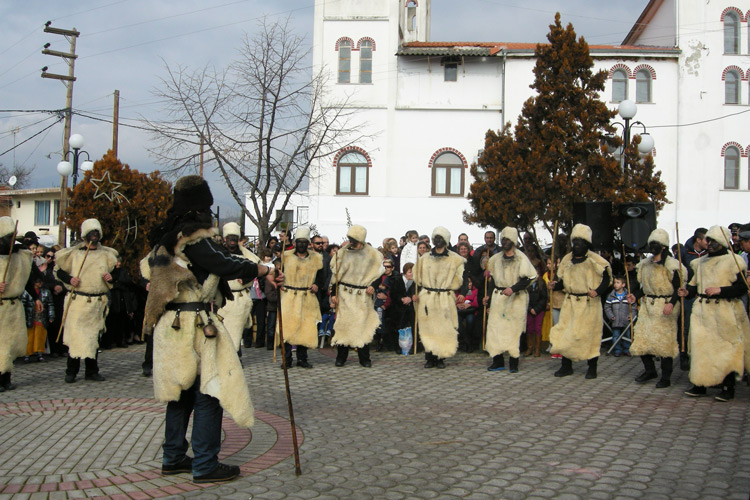Momogeri in Ancient Greece were followers of the god Dionysus. This ancient custom later was absorbed by the culture of Pont. Pontic folk custom can be observed after New Year in the village of Kallifito near the town Drama, as well as in other regions of Greece with different variations.
The roots of this custom go back to pre-Christian times, but Pontians later brought Christian meaning to it. This event symbolizes the revival of nature with the change of the New Year and takes place in the period of the Twelve Days (from Christmas to Epiphany). Dance, theater and music groups are also involved in the performance.
The main characters of the action is Momogeros or Kitty Gotsas and his team, who, as the sun goes down, invade every house in the village and play the tricks, “cheating” them and improvising depending on the situation.
The actors wear sheepskins, their faces are painted in black to intimidate the spectators, and bells are fastened to their belts. The bells in the costumes of the actors come from the traditions of Dionysus. In ancient Greek mythology, Dionysus is the god of winemaking, fertility and fun. The purpose of the bells is to wake up the nature from winter sleeping.
Among the participants of the performance are the bride, the groom, the doctor, the devil, the leader and the priest. The bride symbolizes the culture and diversity of Greece, and the team of the leader Acrita must ensure that the bride is not kidnapped. The devil with the red uniform and horns symbolizes evil.
Bride kidnapping is the culmination of the show. After multiple scenes, the bride and groom reunite, and they are crowned by a priest, who appears in the final and restores the order. To the accompaniment of the Pont lira and dauliu, with songs and dances, Momogeri leave the house and go to the next, where they will improvise and act out the scenes again.
This custom is inscribed on the National Register of Intangible Cultural Heritage in 2013 and on the UNESCO Representative List of Intangible Cultural Heritage of Humanity in 2015.
























